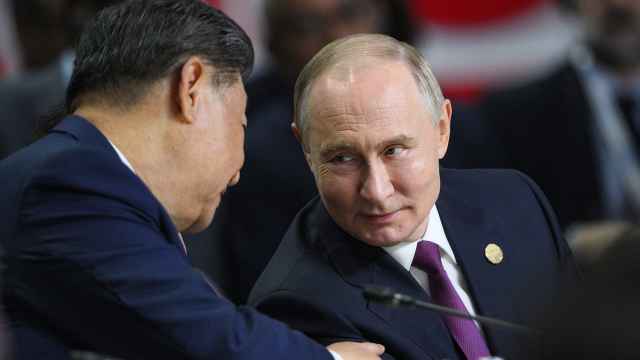I love responsible urban development. I think it's fabulous that a new metro line will open near my house. What I'm not so crazy about is the 24/7 noise, dirt and bumper-to-bumper traffic detoured through our park. But kudos to the genius who came up with the billboard next to the building site: Стройка — на время, метро — навсегда. (Construction is temporary, but the metro is forever.) That always buoys me as I get ready to leap over a construction crater the size of a swimming pool.
Of course, my neighbors and I are still a bit worried that the temporary traffic rerouting might remain after the new station is up and running. After all, as Russians like to say: Нет ничего более постоянного, чем временное. (There is nothing more permanent than something that is temporary.)
This got me thinking about people, events and things that are fleeting — or should be.
The adverb временно (temporarily) and the adjective временный (temporary) can be applied to just about anything, from workers to housing. Я работала временным сотрудником пока не устроилась на штатную должность. (I worked as a temp until I got a full-time job.) Администрация города предоставила временное жильё семьям, пострадавшим от пожара. (The city administration provided temporary housing to families who suffered in the fire.)
Sometimes someone is и.о. (исполняющий обязанности — acting, as in acting director), but he or she might also be the rather dashing врио (временно исполняющий обязанности — temporarily acting), which always struck me as repetitive — someone temporarily filling a temporary position. But sometimes you don't need any acting at all: Его назначили временным директором. (He was appointed temporary director.)
People can be temporary by definition: временщик. I love this word, although like all Russian words I love, I hate to translate it. Временщик is someone who temporarily holds a high position, usually because he or she isn't qualified enough to keep it for long. It is often used to describe favorite companions and hangers-on in royal courts. Think Potemkin and Catherine the Great: Тысячу лет Россия была страной неограниченного самодержавия, страной царей и временщиков. (For 1,000 years Russia was a country with an absolute autocracy, a country of tsars and their favorites.)
Naturally, временщик usually has a nasty connotation — someone who is fly-by-night, with no vested interest in the future of a country or company, just in it for what he or she can grab. В министерство пришли новые люди — дилетанты и временщики. (New people joined the ministry — dilettantes and placeholders.) Временщики приходят и уходят, и никто не может понять, почему воссияла или почему погасла та или иная карьера. (These people are here today, gone tomorrow, and no one knows why one of their careers took off while another's petered out.)
But sometimes временщик is simply a person doing something for a short period of time, with no bad connotation: Они временщики. Работают летом и потом осенью уедут. (They're not full-timers. They work the summer and then leave in the fall.)
More colorful and usually more comical — or condescending — is the expression калиф на час (caliph for an hour), which comes from one of the stories of ''The One Thousand and One Nights.'' English describes this temporary star in a slightly different way: Они характеризовали Фиделя Кастро как калифа на час. (They described Fidel Castro as king for a day.)
Well, they got that wrong. But in the end, темпус фугит (Tempus fugit).
Michele A. Berdy, a Moscow-based translator and interpreter, is author of "The Russian Word's Worth" (Glas), a collection of her columns.
A Message from The Moscow Times:
Dear readers,
We are facing unprecedented challenges. Russia's Prosecutor General's Office has designated The Moscow Times as an "undesirable" organization, criminalizing our work and putting our staff at risk of prosecution. This follows our earlier unjust labeling as a "foreign agent."
These actions are direct attempts to silence independent journalism in Russia. The authorities claim our work "discredits the decisions of the Russian leadership." We see things differently: we strive to provide accurate, unbiased reporting on Russia.
We, the journalists of The Moscow Times, refuse to be silenced. But to continue our work, we need your help.
Your support, no matter how small, makes a world of difference. If you can, please support us monthly starting from just $2. It's quick to set up, and every contribution makes a significant impact.
By supporting The Moscow Times, you're defending open, independent journalism in the face of repression. Thank you for standing with us.
Remind me later.






